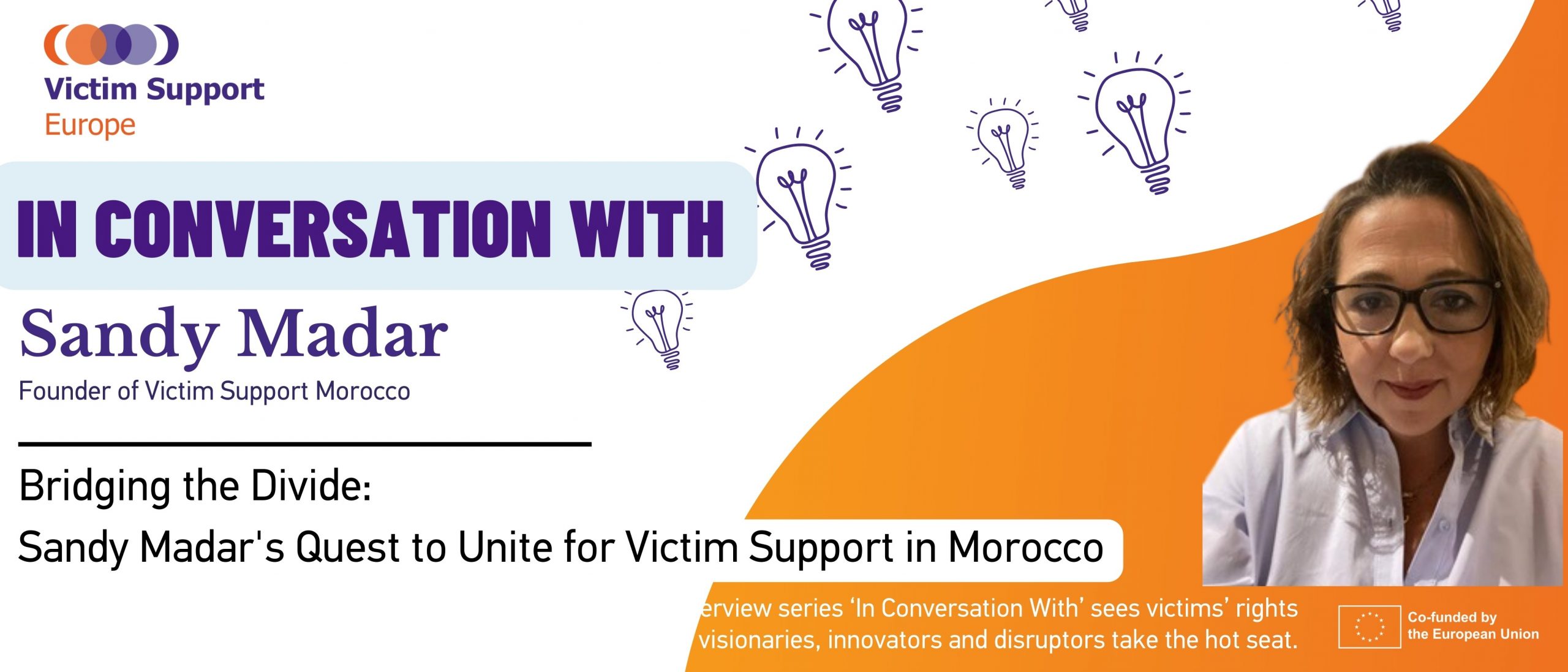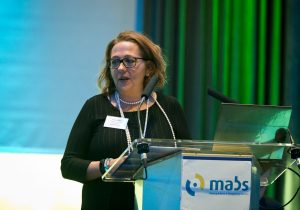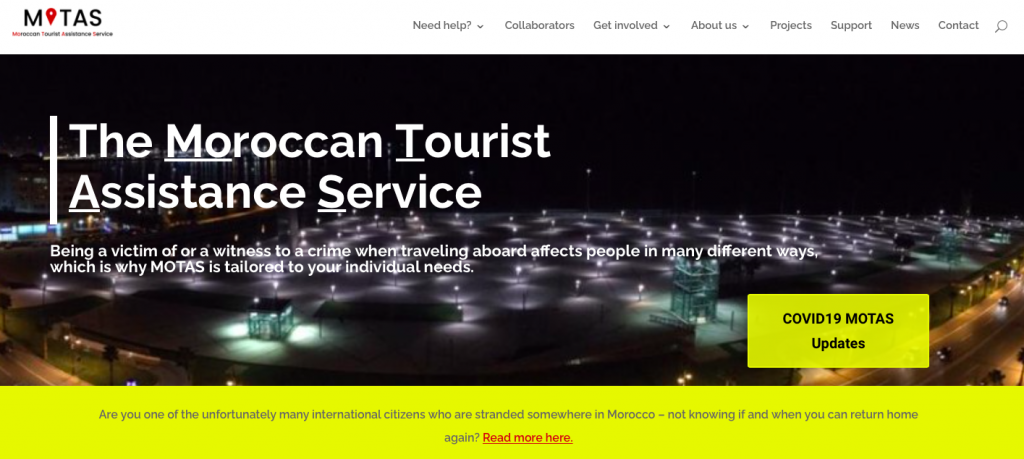
Our interview series ‘In Conversation With’ sees victims’ rights visionaries, innovators and disruptors take the hot seat.
During her childhood in the 1980s, Sandy Madar experienced firsthand the harsh realities faced by the most vulnerable members of society in one of the low-income neighbourhoods of her hometown, Copenhagen. Violence, crime, and gang conflicts were a part of everyday life. However, when Sandy entered the social sector as a young professional in the 1990s, she found herself amidst a transformative wave of change. The scope of social welfare initiatives underwent a significant expansion, opening up new opportunities to make a meaningful difference in the lives of those in need.

Sandy Madar
Sandy Madar is a woman on several missions. After making significant changes to the welfare system in Denmark, she now seeks to address the challenges faced by crime victims in Morocco. Through the establishment of Victim Support Morocco, a national umbrella organisation, Sandy aims to make a lasting impact on the lives of victims in the land of the setting sun.
Madar recounts her journey since the 90s: “I managed to launch multiple startups with the invaluable support of volunteers. Through these endeavours, we have extended our helping hand to countless crime victims and individuals in vulnerable positions across Denmark. A few notable initiatives that bear mentioning include Dinretshjaelp.dk (Your Legal Aid), Blividinbolig.dk (Stay in Your Home initiative) and The Street Manager Association.”
At the forefront of her endeavours lie two remarkable ventures: the Social Legal Aid Fund (DSRF) and The European Consumer Debt Network (ECDN). In 2007, Sandy laid the foundation for DSRF, driven by the vision of providing free legal guidance and debt counseling to those who find themselves socially vulnerable. Not only does the organisation champion the interests of this marginalised group within the political landscape, but it also strives to raise awareness about their needs within society.
“With approximately 120 dedicated individuals on board, the majority of whom are volunteers or unpaid trainees, DSRF has been able to assist thousands of individuals in Denmark”, she explains. “While professionalism and supervision demand a handful of trained and salaried employees to oversee daily operations, the backbone of DSRF remains its compassionate army of volunteers.”
Alongside her remarkable achievements, Sandy holds the esteemed position of President at The European Consumer Debt Network (ECDN). Formed in 2007, ECDN stands as a beacon of solidarity across European civil society. Comprising a diverse array of stakeholders, the network diligently works to combat excessive debt and advance financial inclusion.
Her life story is adorned with threads of resilience and endurance. These qualities were once again on display when she fearlessly established The Moroccan Tourist Assistance Service (MOTAS) in 2020. MOTAS extends immediate and comprehensive assistance to international volunteers and unfortunate tourists who have fallen prey to crime and other distressing incidents.

Collaborating closely with domestic and international agencies and associations, MOTAS leaves no stone unturned in providing support to its volunteers following incidents of crime or accidents.
“Having personally experienced the impact of crime, I deeply comprehend the emotional and mental toll it takes. In 2020, MOTAS set out on a mission to create a cross-border victim support system in Morocco, collaborating with local and global partners. My vision is to break the silence surrounding cross-border victims and foster a future where discussing their challenges is no longer taboo. This represents the ultimate triumph for MOTAS”, she confesses.
Sandy can vividly recall the pivotal moment that sparked her determination to establish Victim Support Morocco. It was in February 2019 when she found herself entangled in a distressing situation in Morocco, being pursued by a relentless stalker. This instance left her genuinely frightened, a rare occurrence for someone who had grown accustomed to navigating dangers due to a challenging upbringing. Seeking assistance, Sandy turned to the local police, only to be met with disappointment as her plea went unheard. The arduous process she endured during those days confined to her hotel room deeply resonated with her.
Motivated by her personal ordeal, Sandy dedicated an entire year to advocating for the understanding of the challenges faced by tourists in Morocco, tirelessly attempting to convey her message to the police. This journey led her to collaborate with the Irish Tourist Assistance Service (ITAS) and Victim Support Europe (VSE), seeking their guidance on establishing a support organisation for tourist victims of crime.
However, before she could fully embark on her envisioned project, a crucial encounter occurred – a Moroccan woman became a victim before Sandy’s eyes. While Sandy had heard countless stories of victims throughout her quest to build support for tourists, this particular incident struck her with overwhelming force. Accompanying the woman to the police station, Sandy witnessed yet another woman in a similar plight. In that moment, her mind raced, questioning her own purpose. How could she, an outsider, come to Morocco with the intention of creating a victim support program exclusively for tourists, when the urgent need for such support existed among the local population?
This profound insight sparked a significant shift in Sandy’s perspective. Rather than solely establishing the Moroccan Tourist Assistance Service (MOTAS), she understood that there should also be a dedicated entity, Victim Support Morocco, catering to the needs of individuals living within the country.
In her recent years in Morocco, Madar dedicated herself to developing resources and frameworks for volunteer work in the country. Volunteer programs were not prevalent, which posed a challenge since nonprofit organisations heavily rely on volunteers. Sandy envisions a future for Victim Support Morocco where experienced volunteers from Europe, who have worked with crime victims, can join forces with local volunteers to provide valuable education and support.

Morocco is currently navigating the process of advancing victims’ rights, and the examination of existing shortcomings and violations has been eye-opening and humbling.
“Ironically, the victims’ law underwent revision in 2019, precisely when I found myself entangled in a stalking situation. However, the implementation of this law remains largely symbolic, lacking awareness among law enforcement, healthcare professionals, and those involved in victim support,” she says. “As Victim Support Morocco, our mission revolves around enlightening society about the existence of victims’ rights through dedicated campaigns. This is our starting point – a crucial endeavour to ensure people are aware of their rights before they attempt to exercise them. Morocco has a long road ahead in terms of progress. It was within this country that I first encountered the notion of “victim blaming.” Despite enduring personal hardships, including instances of assault, it was not until my experience with stalking in Morocco that I truly comprehended the prevalence of victim blaming within the system. Consequently, victims often harbour fear when approaching law enforcement. The question remains: How can we empower them to exercise their rights by overcoming this barrier?”
Sandy and the other four board members of Victim Support Morocco recognise several key responsibilities. Their primary objective is to foster unity among frontline support services based in Morocco, enabling more effective coordination in delivering assistance to victims. Additionally, they aim to educate law enforcement professionals about victims’ rights and develop essential toolkits for crime victims, providing guidance throughout the criminal justice process.
“Furthermore, our team harbours an ambition to establish a national victim support hotline, as many frontline organisations lack this resource due to limited funding”, says Sandy. “Simultaneously, we are actively involved in constructing a comprehensive database that consolidates information on all available support services in the country, catering to diverse groups of crime victims.” Sandy is under no illusions about the immense challenges involved in establishing a victim support organisation from the ground up. Her experiences in Morocco thus far have been fraught with obstacles. However, with a personal and professional history steeped in resilience, it comes as no surprise that Sandy firmly believes in never giving up.
“Most young organisations tend to be rather naive in the early stages,” she reflects. “But we didn’t have that luxury. We were well aware of the difficulties that lay ahead. The concept of a victim support service we’re introducing is entirely different from anything previously seen in this realm. It carries a certain degree of risk since it’s unfamiliar to people. However, we believe, and those we’ve already aided share the same sentiment, that the time is ripe for individuals to gain a deeper understanding of the direction the future should take,” Madar concludes.

